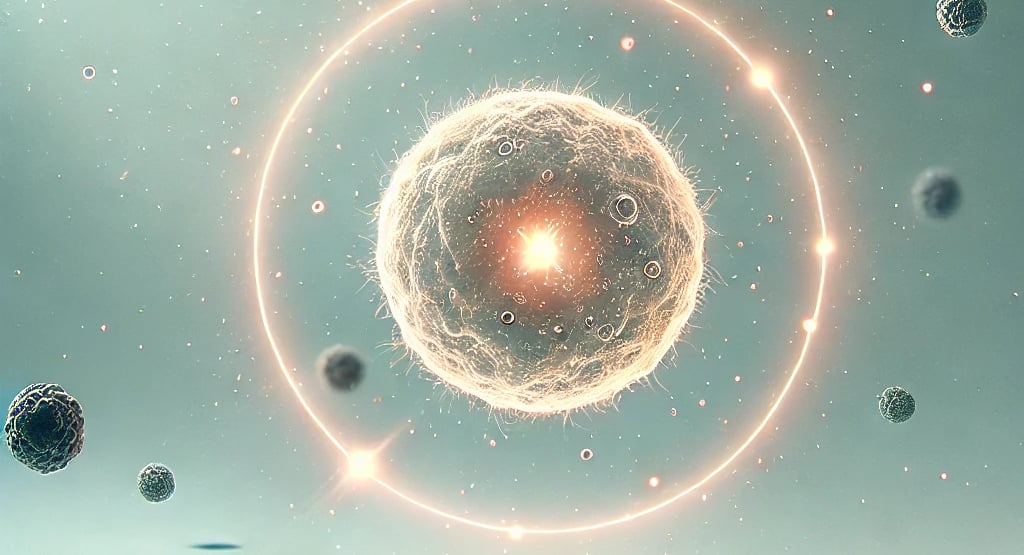Tocotrienols - Natural Cancer Prevention & Treatment
Discover how tocotrienols serve as a powerful, natural option for treating existing cancers and preventing their development. Learn about their role in enhancing traditional therapies and targeting various cancers effectively.
INFLAMMATIONCANCERCELLULAR HEALTH
Alexander J
9/6/20242 min read


```html
Therapeutic Potential of Tocotrienols in Cancer Treatment
Tocotrienols are a form of vitamin E that have shown promising anti-cancer properties in various studies. Unlike tocopherols (the other form of vitamin E), tocotrienols have unique abilities that make them more effective in targeting cancer cells.
How Tocotrienols Act on Cancer Cells
Tocotrienols exhibit their anti-cancer effects by targeting several pathways in cancer cells:
Inducing Apoptosis (Cell Death):
They promote programmed cell death in cancer cells, particularly through mitochondrial pathways.
Inhibiting Cell Proliferation:
Tocotrienols inhibit the growth and multiplication of cancer cells by affecting signaling pathways like NF-κB and STAT3, which are often overactive in cancer.
Preventing Angiogenesis:
Cancer cells rely on new blood vessels to grow and spread. Tocotrienols hinder this process, cutting off the tumor's nutrient supply.
Reducing Inflammation:
Chronic inflammation is a known contributor to cancer progression. Tocotrienols help reduce inflammation, which may suppress tumor growth.
Tocotrienols as a Standalone Treatment and Enhancer of Other Therapies
While tocotrienols can work independently to combat cancer, they are especially valuable when combined with traditional cancer therapies:
Chemotherapy Enhancement:
Tocotrienols enhance the efficacy of certain chemotherapeutic agents, making cancer cells more sensitive to treatment. They also help in reducing the toxicity of chemotherapy.
Radiotherapy Synergy:
When used alongside radiotherapy, tocotrienols increase cancer cell damage while protecting normal cells from radiation-induced damage.
These effects make tocotrienols a potential co-treatment that can improve outcomes and reduce side effects of conventional treatments.
Cancers Where Tocotrienols Show Promise
Tocotrienols have shown efficacy against a variety of cancers, including:
Breast Cancer:
Effective in both hormone-responsive and triple-negative breast cancer, tocotrienols inhibit cell growth and induce apoptosis.
Prostate Cancer:
They reduce proliferation of prostate cancer cells and enhance the effect of existing therapies.
Pancreatic Cancer:
This aggressive cancer shows responsiveness to tocotrienols by inhibiting key survival pathways in cancer cells.
Liver Cancer:
Tocotrienols help prevent the progression of liver cancer by reducing cell proliferation and inducing apoptosis.
Colorectal Cancer:
Studies suggest tocotrienols suppress the growth of colorectal cancer cells, particularly through inflammation reduction and inhibition of angiogenesis.
Who Should Consider Taking Tocotrienols?
Patients Undergoing Cancer Treatment:
Individuals receiving chemotherapy or radiotherapy might benefit from tocotrienol supplementation, as it can enhance the effects of these treatments and reduce their side effects.
Those with Early-Stage Cancers or Pre-Cancerous Conditions:
Tocotrienols might help slow the progression of early-stage cancers.
At-Risk Populations:
People with a family history of cancer or those at high risk due to lifestyle or environmental factors may consider tocotrienols as a preventive measure due to their ability to reduce inflammation and neutralize oxidative stress.
Tocotrienols should be used under the supervision of a healthcare provider, especially in combination with other treatments.
In summary, tocotrienols offer a powerful, natural option for both treating existing cancers and potentially preventing cancer development. Their role in improving the effectiveness of traditional therapies and targeting various cancers makes them a promising adjunct in cancer management.
Reference: "Revisiting the therapeutic potential of tocotrienol" Victoria University Research.
The Best Time to Prevent Disease Is Before It Begins
Taking charge of your health today can profoundly impact your well-being tomorrow. By embracing preventive strategies and informed lifestyle choices, you empower yourself to reduce the risk of chronic diseases and enhance your quality of life.
Explore Further:
Visit Our Health Store: Discover a curated selection of supplements and wellness products designed to support your preventive health journey.
Subscribe to Our Newsletter: Stay informed with the latest research, health tips, and exclusive offers by subscribing to our newsletter. Access our newsletter archive for a wealth of information to guide your wellness path.
Empower yourself with knowledge and proactive choices, your future self will thank you.
